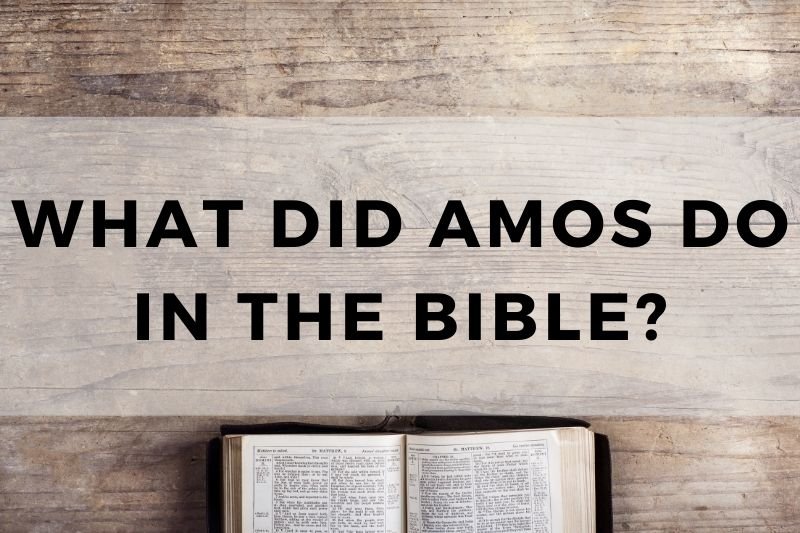
In the Bible, there are many figures whose stories shape the faith of believers. One such figure is Amos. His account offers insights into prophecy, justice, and divine intervention. Understanding Amos’s role in the biblical narrative provides a glimpse into the moral and social concerns of his time.
Through his actions and words, Amos delivers messages of warning, rebuke, and hope, resonating across generations. Let’s dive into the life and deeds of Amos, a significant prophet in the Old Testament.
Who was Amos in the Bible?
Amos, a shepherd from Tekoa, emerges in the Bible as a prophet during a critical period in Israel’s history. He lived during the reigns of Uzziah in Judah and Jeroboam II in Israel, around the 8th century BCE.
Amos wasn’t a professional prophet nor was he born into a prophetic lineage. Instead, he describes himself as a “herdsman and a dresser of sycamore figs” (Amos 7:14), indicating his humble origins. Despite his humble background, Amos was chosen by God to deliver prophetic messages to the people of Israel.
Amos’s ministry primarily targeted the northern kingdom of Israel, although he also prophesied against other nations. His words often centered on issues of social injustice, moral decay, and the neglect of the poor and marginalized.
Despite facing opposition and rejection, Amos remained steadfast in his mission, speaking truth to power without compromise. His prophecies continue to resonate today, challenging individuals and societies to uphold righteousness and justice in their actions.
What Did Amos Do in the Bible?
#1. Prophetic Calling
Amos’s journey into prophecy commenced with a profound divine calling. In Amos 7:15, he recounts God’s summoning: “The Lord took me from following the flock, and the Lord said to me, ‘Go, prophesy to my people Israel.'” This calling was not solicited nor expected by Amos, a mere shepherd and fig farmer. However, it propelled him into a realm of divine communication, where he became a mouthpiece for God’s messages.
#2. Prophecies Against Nations
Amos didn’t reserve his prophetic fervor solely for Israel; he extended it to neighboring nations as well. In Amos 1:3-2:16, he delivers messages of condemnation to Damascus, Gaza, Tyre, Edom, Ammon, and Moab. These prophecies underscored God’s sovereignty over all nations and His intolerance of injustice and wickedness, irrespective of borders.
#3. Prophetic Messages to Israel
The heart of Amos’s prophetic ministry beat with messages directed at Israel. His words targeted the nation’s moral corruption, idolatry, and social injustices. Amos 5:24 encapsulates the essence of his message: “But let justice roll down like waters, and righteousness like an ever-flowing stream.” Through these words, Amos urgently called upon Israel to repent and return to the ways of the Lord.
#4. Social Justice Advocacy
Amos’s prophetic voice resonated most powerfully in his advocacy for social justice. He vehemently condemned the exploitation of the poor and marginalized by the wealthy elite. Amos 2:6-7 denounces such injustices: “They sell the righteous for silver, and the needy for a pair of sandals… they trample the head of the poor into the dust of the earth.” His message emphasized the importance of compassion, fairness, and equity in society.
#5. Visionary Experiences
Amos’s prophetic ministry was punctuated by visionary experiences that illuminated his understanding of God’s judgments and Israel’s future. Amos 7:1-9 records a series of visions, including those of locusts, fire, and a plumb line, symbolizing divine judgment, destruction, and measurement. These visions served as divine revelations, guiding Amos in his prophetic pronouncements.
#6. Confrontation with Amaziah
Amos’s uncompromising proclamation of God’s word often brought him into direct conflict with the religious authorities of his time. One notable confrontation occurred between Amos and Amaziah, the priest of Bethel. Amaziah attempted to silence Amos, accusing him of conspiracy and urging him to leave the land. However, Amos fearlessly stood his ground, reaffirming his divine commission and the authority of his message.
#7. Hope for Restoration
Despite the severity of his prophecies, Amos also conveyed messages of hope and restoration for Israel. Amidst the warnings of impending judgment, he prophesied a future restoration and blessing for God’s people. Amos 9:11-15 speaks of a time when God will rebuild the fallen tabernacle of David, symbolizing the restoration of the Davidic monarchy and the flourishing of the nation.
Closing Thoughts
Amos, a shepherd turned prophet, exemplifies courage and conviction in delivering God’s messages. His prophetic calling transcended social status, as he fearlessly confronted injustice and called for repentance.
Through visions and confrontations, Amos remained steadfast, advocating for social justice and proclaiming hope amidst impending judgment. His legacy challenges us to stand for righteousness and pursue justice in our own contexts.
As we reflect on the life and deeds of Amos, may we heed his call to uphold the values of compassion, fairness, and equity in our societies.
